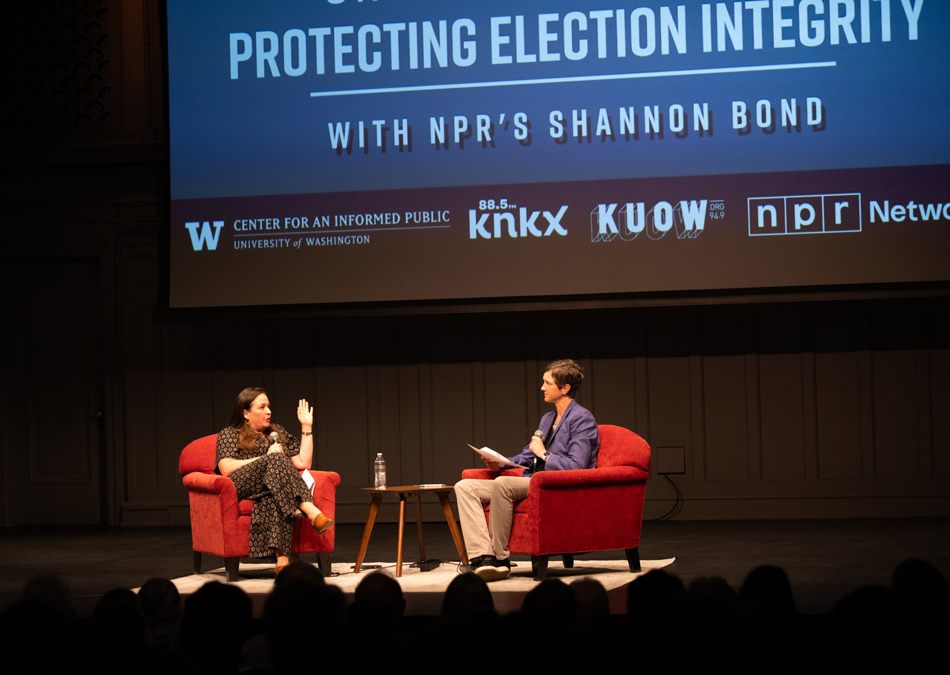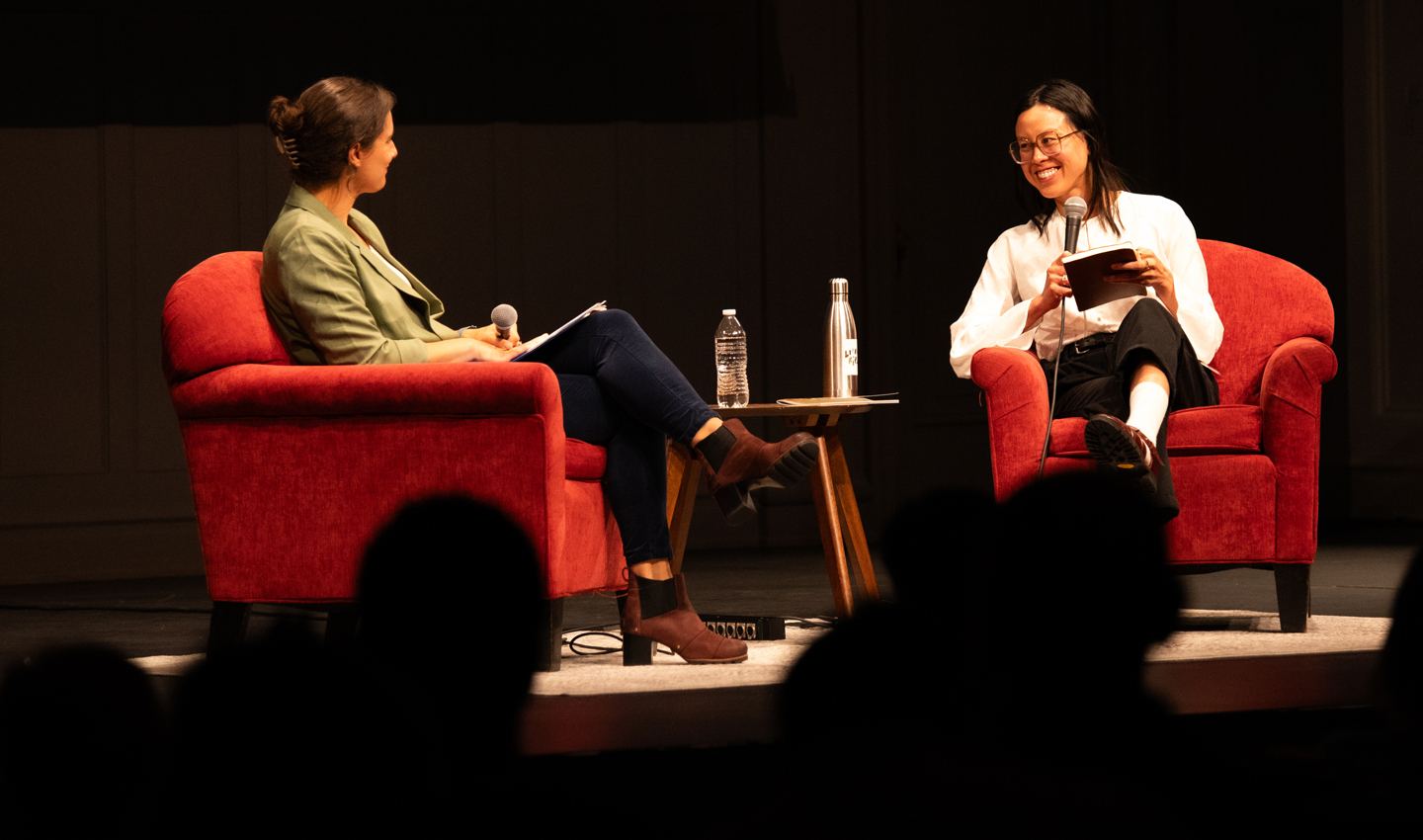Speaking to a crowd of about 300 at Town Hall Seattle, Emma S. Spiro noted the many changes as well as familiar patterns that she and her colleagues at the University of Washington Center for an Informed Public have researched in the five years since the CIP’s founding.
The Sept. 11 conversation on Town Hall’s Great Hall stage focused on research, reflections and dialogue on rumors, mis- and disinformation, and different ways of framing topics related to election integrity. Spiro, associate professor at the Information School and incoming CIP faculty director, was joined in conversation by Sarah Nguyễn, Ph.D. candidate at the Information School; Kate Starbird, CIP co-founder and outgoing director and professor of Human Centered Design & Engineering; and NPR correspondent Shannon Bond.
The mission of the Center for an Informed Public (CIP) is to resist strategic misinformation, promote an informed society, and strengthen democratic discourse. The CIP is one of the multidisciplinary research centers affiliated with the University of Washington Information School.
The CIP defines rumors as “unverified or contested claims or stories spreading through informal channels,” and the center’s new series “What to expect when we’re electing” details phases of elections, including those with an increased prevalence of rumoring.
During the discussion at Town Hall, held in collaboration with KUOW and KNKX public media, Nguyễn (pictured at top right) spoke about her doctoral research, including work studying the spread of information in Vietnamese American communities. One group she has worked with are Vietnamese American elders, who are often underserved by traditional news media. Without reliable information translated into their mother tongue, and with less familiarity with deepfakes, algorithms and other technologies, this group could be vulnerable to scams and misinformation, she said.
Nguyễn and Spiro discussed the importance of approaching this research with a participatory model. Nguyễn designed workshops to engage the community, rather than studying them from a distance. She connected with a group of elders who have been meeting weekly for the past 50 years. Despite their initial hesitation, Nguyễn was able to explore research questions with them, such as “How do you share information? What makes you trust information?” And, “How do you receive information?”
In a humorous anecdote, Nguyễn told a story about how doing karaoke with research participants helped them to build trust and community across a generational divide. Nguyễn and Spiro also spoke about the ways in which some politicians have exploited this group of elders’ fears and lingering trauma from the Vietnam War, known in Vietnam as “the American War,” such as concerns about communism, funding for militarization abroad, and national division. This research will inform her dissertation, currently titled “Sharing Stories, Sharing Trust: Making sense of transnational information and diasporic memories.”

“Students like Sarah Nguyễn shape how we do our work” at the CIP, Starbird said. Sharing the stage with NPR’s Bond, the often-interviewed Starbird had the chance to turn the table and interview the media correspondent. Starbird and Bond discussed the key role that vetted journalism plays in addressing misinformation, the challenges of shifting and charged terminology, and the current landscape in which rumors can spread rapidly.
Given the highly politicized nature of the terms “misinformation,” “disinformation,” and the previously common “fake news,” Starbird noted that she and her colleagues have found “rumor” to be a more useful term. Rumors, she noted, sometimes do turn out to be true. Savvy creators produce content to fit certain pre-existing frames, Starbird said, such as border crises and a rigged election.
“Disinformation is not a piece of content,” Starbird noted. “It’s a campaign.” Bond and Starbird discussed the use of influencers to spread information, including the recent Department of Justice investigation into alleged Russian payments to U.S. influencers. Compared to bots, influencers are fairly cost effective for those who wish to reach large audiences, Starbird said.
Bond and Starbird compared challenges for journalists and academic researchers in monitoring constantly changing online information, particularly in an election year. They noted that data that was previously free to access on Twitter now costs hundreds of thousands of dollars to access on X. The lack of transparency and reduced content moderation can make it easier for disinformation campaigns to thrive in the current context, but new research methods can be applied.
“I’m still hopeful, and I do see signs of change,” Starbird told Bond. Working with a dedicated team of researchers, including graduate researchers such as Nguyễn, can make this challenging work more manageable and enjoyable.
After publishing several academic papers on her research, Nguyễn decided to share her work in a way that is more accessible to a larger audience. The CIP and Nguyễn published "Changing Tides," an illustrated booklet in Vietnamese and English that synthesizes research findings into a fictional narrative. This work was created in collaboration with CIP Research Scientist and Information School Affiliate Assistant Professor Rachel Moran-Prestridge, UW Honors undergraduate student Celestine Le, UW Fine Arts alum and graphic artist Anh Nguyen, and translator Trung Anh Nguyen. You can read "Changing Tides" online to learn more about this research, and follow the CIP’s election research on its website.
